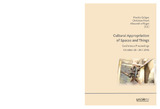Citation link:
http://dx.doi.org/10.25819/ubsi/5429Files in This Item:
| File | Description | Size | Format | |
|---|---|---|---|---|
| Cultural_appropriation.pdf | 5.36 MB | Adobe PDF |  View/Open |
| Dokument Type: | Conference Proceedings | metadata.dc.title: | Cultural appropriation of spaces and things | Title addition: | conference proceedings October 28–30/2019 | Authors: | Gröger, Martin Prust, Christian Flügel, Alexandra Giffoni Junior, Alexandre Avelino Pereira, Sebastião Lázaro Netto, Alberto Barella Kim, Hyeongjoo Barfod, Karen Daugbjerg, Peer Höper, Jan Janssen, Mareike Gaffron, Julia Heck, Volker Sukopp, Thomas Dorn, André Georg, Andree Landrock, Irina Schaal, Markus Weipert, Matthias Schommer, Mirko Gaubitz, Sarah Brill, Swaantje Gießelmann, Urs Birkhölzer, Uta |
Institute: | Department Chemie - Biologie | Free keywords: | Kinder, Kulturelle Aneignung, Räume, Dinge, Children, Cultural appropriation, Spaces and things | Dewey Decimal Classification: | 370 Erziehung, Schul- und Bildungswesen | GHBS-Clases: | IFT IID |
Issue Date: | 2020 | Publish Date: | 2020 | Source: | Siegen : universi - Universitätsverlag Siegen, 2020. - ISBN 978-3-96182-079-5 | Abstract: | This proceedings volume gathers papers presented at the symposium “Cultural Appropriation of Spaces and Things” held in Siegen, Germany in October 2019. All over the world, children are confronted with an increasingly complicated and fast-moving world. Children need elementary cultural techniques and skills to shape their own lives and enable them to find individual interpretations of meaning. In addition to the acquisition of classical cultural techniques such as arithmetic, writing and reading, the competent handling of spaces and things – through manifold processes of appropriation and reflection – is crucial. It forms the basis and prerequisite for the development of competences or abilities that are suitable for understanding the dimensions, the complexity and changeability of their world and enable them to critically deal with associated problems and find appropriate solutions. The aim of the conference was to find suitable ways for children all over the world for a methodically and didactically guided examination of their natural, social and technical environment. At the same time, the aim was to achieve a mutual enrichment of monodisciplinary research accesses. It also included a self-critical reflection of one’s own culturally shaped approaches of research. Contents: Martin Gröger, Christian Prust, Alexandra Flügel: Preface LECTURES Alexandre Avelino Giffoni Junior, Sebastião Lázaro Pereira, Alberto Barella Netto: Haus Früher Hilfen UniRV: A historic building in process in the heart of Brazil Hyeongjoo Kim: Designing and Applying the Moral Turing Test for Korean Children Karen Barfod and Peer Daugbjerg: Teaching Science and Mathematics Outside the Classroom, a pilot study on assessing inquiry-based practices Jan Höper: Towards integrated science education by using mobile technologies outdoors WORKSHOPS Mareike Janssen: Exploring the things of life: First insights into chemical processes with sparkling water as an example Julia Gaffron, Martin Gröger: Children like to experiment, many teachers apparently do not Volker Heck: Alexander von Humboldt - The Voyage to the Americas as an approach to science in Primary School Thomas Sukopp: Interculturality in Philosophy Education: Challenges and Prospects of Education for Sustainable Development in Primary Schools POSTERS André Dorn, Martin Gröger: ESD in general studies -prospective general studies teachers deal with the educational concept of ESD in a student-oriented and cooperative manner Andree Georg: From Carlowitz to Sustainable Development and Education for Sustainable Development Irina Landrock: Children at NS Memorial Sites Dr. Markus Schaal: Martha Muchow in the Context of the New Sociology of Childhood What Can a Classic Still Teach Us Today? Martin Gröger: Open air laboratory FLEX – Starting to learn chemistry in a near-natural learning environment Martin Gröger: FoodLAB - a molecular gastronomic experimental laboratory in teacher training Martin Gröger: How Alexander von Humboldt saw the world from a chemist’s point of view Matthias Weipert: Extracurricular learning locations in the historical perspective of general studies - the example of the Wendener Hütte Mirko Schommer: Spatial Orientation - Competence expectations and common misconceptions based on map projections Sarah Gaubitz: Options for handling complex problems of global change from the perspective of primary school children Swaantje Brill: Museum Field Trips in Primary School: An Approach to Children’s Perspectives Urs Gießelmann and Uta Birkhölzer: The “Hauberg” as an extracurricular learning location |
DOI: | http://dx.doi.org/10.25819/ubsi/5429 | URN: | urn:nbn:de:hbz:467-17117 | URI: | https://dspace.ub.uni-siegen.de/handle/ubsi/1711 | License: | http://creativecommons.org/licenses/by-sa/4.0/ |
| Appears in Collections: | Universi Publikationen aus der Universität Siegen |
This item is protected by original copyright |
Page view(s)
1,195
checked on Nov 25, 2024
Download(s)
1,400
checked on Nov 25, 2024
Google ScholarTM
Check
Altmetric
This item is licensed under a Creative Commons License


